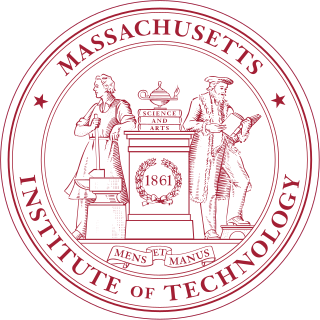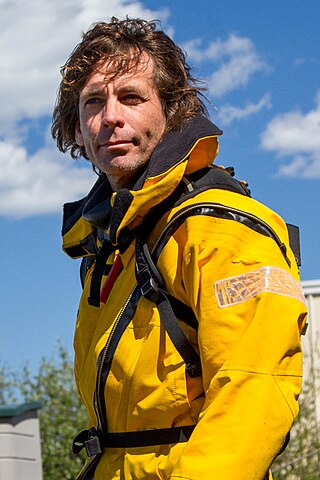
The Massachusetts Institute of Technology (MIT) is a private land-grant research university in Cambridge, Massachusetts. Established in 1861, MIT has played a significant role in the development of many areas of modern technology and science.

The MIT Sloan School of Management is the business school of the Massachusetts Institute of Technology, a private university in Cambridge, Massachusetts. MIT Sloan offers bachelor's, master's, and doctoral degree programs, as well as executive education. Its degree programs are among the most selective in the world. MIT Sloan emphasizes innovation in practice and research. Many influential ideas in management and finance originated at the school, including the Black–Scholes model, the Solow–Swan model, the random walk hypothesis, the binomial options pricing model, and the field of system dynamics. The faculty has included numerous Nobel laureates in economics and John Bates Clark Medal winners.

Computer Science and Artificial Intelligence Laboratory (CSAIL) is a research institute at the Massachusetts Institute of Technology (MIT) formed by the 2003 merger of the Laboratory for Computer Science (LCS) and the Artificial Intelligence Laboratory. Housed within the Ray and Maria Stata Center, CSAIL is the largest on-campus laboratory as measured by research scope and membership. It is part of the Schwarzman College of Computing but is also overseen by the MIT Vice President of Research.
Electrification is the process of powering by electricity and, in many contexts, the introduction of such power by changing over from an earlier power source.

Joichi "Joi" Ito is a Japanese entrepreneur and venture capitalist. He is the President of Chiba Institute of Technology. He is a former director of the MIT Media Lab, former professor of the practice of media arts and sciences at MIT, and a former visiting professor of practice at the Harvard Law School. Ito has received recognition for his role as an entrepreneur focused on Internet and technology companies and has founded, among other companies, PSINet Japan, Digital Garage, and Infoseek Japan. Ito is a strategic advisor to Sony Corporation and general partner of Neoteny Labs. Ito wrote a monthly column in the Ideas section of Wired.

Ethan Zuckerman is an American media scholar, blogger, and Internet activist. He was the director of the MIT Center for Civic Media, and Associate Professor of the Practice in Media Arts and Sciences at MIT until May 2020, and the author of the 2013 book Rewire: Digital Cosmopolitans in the Age of Connection, which won the Zócalo Book Prize. In 2020, he became an associate professor of public policy, communication and information at the University of Massachusetts.

Leo Rafael Reif is a Venezuelan American electrical engineer and academic administrator. He previously served as the 17th president of the Massachusetts Institute of Technology from 2012 to 2022, provost of the institute from 2005 to 2012, and dean of the institute's EECS department from 2004 to 2005.

The MIT School of Architecture and Planning is one of the five schools of the Massachusetts Institute of Technology, located in Cambridge, Massachusetts. Founded in 1865 by William Robert Ware, the school offered the first formal architectural curriculum in the United States and the first architecture program in the world operating within the establishment of a university. MIT SAP is considered a global academic leader in the design field and one of the most accomplished schools in the world. MIT's department of architecture has consistently ranked among the top architecture/built environment schools in the world and from 2015 to 2018 was ranked highest in the world in QS World University Rankings. In 2019, it was ranked second to The Bartlett but regained the number one position later on in the 2020 rankings.

A solar power tower, also known as 'central tower' power plant or 'heliostat' power plant, is a type of solar furnace using a tower to receive focused sunlight. It uses an array of flat, movable mirrors to focus the sun's rays upon a collector tower. Concentrating Solar Power (CSP) systems are seen as one viable solution for renewable, pollution-free energy.

eSolar is a privately held company that develops concentrating solar power (CSP) plant technology. The company was founded by the Pasadena-based business incubator Idealab in 2007 as a developer of CSP plant technology. The company aims to develop a low cost alternative to fossil fuels through a combination of small heliostats, modular architecture, and a high-precision sun-tracking system. In October 2017, an article in GreenTech Media suggested that eSolar ceased business in late 2016.

The Design Futures Council is an interdisciplinary network of design, product, and construction leaders exploring global trends, challenges, and opportunities to advance innovation and shape the future of the industry and environment. Members include architecture and design firms, building product manufacturers, service providers, and forward-thinking AEC firms of all sizes that take an active interest in their future.

Practical Solar, Inc. is an American manufacturer of heliostats used for concentrating solar power, as well as for residential and commercial natural lighting (daylighting) applications. The company, located in Boston, Massachusetts, introduced its heliostat system for sale in February 2009. According to the detailed agenda for the 5th Annual Conference on Clean Energy in Boston, Practical Solar’s chief operating officer David Howell made a presentation seeking funding for the company at the “Investor Pitch Session” on November 12, 2009.
Squid Labs was an American independent research and development company founded by a group of four MIT graduates. In 2004, Colin Bulthaup, Dan Goldwater, Saul Griffith, and Eric Wilhelm moved from the East Coast to California to found the company known as Squid Labs. During its years of existence from 2004 to 2007, Squid Labs added three more members to its team: Geo Homsy, Corwin Hardham and Ryan McKinley. Working out of a warehouse in Emeryville, the group adopted the slogan "We're not a think tank, we're a do tank." and created a handful of patents and inventions including an electronically sensed rope, portable pull-cord generators, and a machine that could manufacture eyeglasses of any prescriptions at extremely low cost. Squid Labs was also the birthplace for many companies still running today, such as Makani Power and Howtoons. Although the company no longer exists, Squid Lab's co-founder, Saul Griffith created a similar company in San Francisco named Otherlab.
Makani Technologies LLC was an Alameda, California-based company that developed airborne wind turbines. Founded in 2006, Makani was acquired by Google in May 2013. In February 2020, Makani was shut down by Alphabet, Google's parent company.

X Development LLC, doing business as X, is an American semi-secret research and development facility and organization founded by Google in January 2010. X has its headquarters about a mile and a half from Alphabet's corporate headquarters, the Googleplex, in Mountain View, California.

Paula Therese Hammond is a David H. Koch Professor in Engineering and the Head of the Department of Chemical Engineering at the Massachusetts Institute of Technology (MIT). She was the first woman and person of color appointed as head of the Chemical Engineering department. Her laboratory designs polymers and nanoparticles for drug delivery and energy-related applications including batteries and fuel cells.
Jay Saul Silver is an electrical engineer and toy inventor from Cocoa Beach, Florida. Silver is the Founder and CEO of JoyLabz and MaKey MaKey and was the first-ever Maker Research Scientist at Intel.

Donald Lewis Montague is a Canadian-American watersport athlete and designer. He is President of Kai Concepts, co-founder of Makani Power, and the head of the Kiteboat Project in Alameda, California.
Thomas Linn Dinwoodie is a cleantech entrepreneur, inventor, and founder of SunPower Corporation Systems. He holds a long-standing interest in accelerating the transition to clean energy and other climate-sustaining practices. Dinwoodie is also an architect.

Leah Cardamore Stokes is a Canadian-American political scientist specializing in environmental policy. She is the Anton Vonk Associate Professor of Environmental Politics at the University of California, Santa Barbara. In addition, Stokes is a senior policy consultant at Evergreen Action and Rewiring America. She also hosts the climate change podcast A Matter of Degrees. Her research focuses on political behavior, public opinion, and the politics of energy and environmental policy in the United States.
















